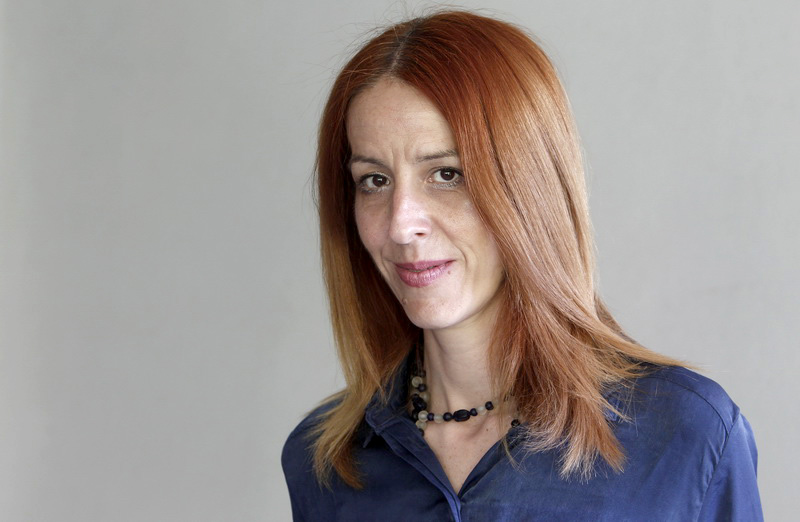Everything was different this time last year

Aleksandra M. Mitevska
It seems like it was yesterday, but a whole year has passed since the country’s former President Gjorge Ivanov, speaking at the United Nations General Assembly, called for a boycott of the name referendum, further heightening uncertainty over the success of the vote that was supposed to provide verification of the agreement reached last summer by Zoran Zaev’s government in Skopje and Alexis Tsipras’ government in Athens.
Although last year’s referendum did not meet expectations, primarily of the Macedonian government and the international community, which then put all the logistics into force so that the three-decade dispute agreement with Greece would to obtain civil recognition in our country, the Prespa Agreement not only has become a reality, but it also survived the changes of the executive branch – both in Skopje and Athens. That is, Ivanov’s leaving for “presidential retirement” and the arrival of the new Greek government, headed by Kyriakos Mitsotakis – who last year, similar to the domestic opposition, but with theses in the opposite direction, strongly opposed the agreement that opened a new era in relations between North Macedonia and Greece.
In fact, developments in recent days on the political scene in the country, where the focus on the “Racket” affair and the SPO turbulence is gradually diverting towards the expected date for EU accession talks, are another indication that changes are possible in a relatively short period of time, and that they will significantly change the course of the country. Of course, the personal changes in power at the top of the spring have also been affected. On the other hand, the latest developments show that even the change of the constitutional name of the country, which, among other things, enabled the country’s full membership in NATO, did not cause significant changes in the consciousness of some of the main actors on the political scene in the country, known as the “designated preventers” of the Euro-Atlantic processes.
Again this year, a large Macedonian delegation traveled to New York to participate in the annual UN General Assembly, but in a very different setting, and in a different composition than last year. Over the weekend, among those who packed their suitcases to New York is Prime Minister Zaev, who in his address to the General Assembly will certainly not skip mentioning the Prespa Agreement as an international document, which was negotiated under UN auspices, and which provided the Euro-Atlantic future of our country, after a decade of stalemate and despite the turmoil that has been taking place internally in the domestic political context, including the recent “Racket” affair and the collapse of the SPO.
One of the most important details related to the stay of the Macedonian delegation in New York is of course the announcement for tomorrow – Zaev and Mitsotakis’ first meeting, after the change of power in Greece. Far from expecting that this first meeting will be as enjoyable as Zaev had with Tsipras shortly before and after the Prespa Agreement was signed. However, it can be expected that this meeting will be an initial catalyst for the establishment of new cooperation relations between the two countries. On the other hand, the opposition’s attempts to stubbornly, and in a populist manner, insist on the old name of the country are certainly not helpful. And there were just a few examples of this in the last few days:
Almost five months since he left the Vodno presidential residence, Ivanov is back in the public eye these days, but now because of the topic imposed by the Anti-Corruption Commission on the great privileges of former heads of state.
The calls from the Anti-Corruption Commission also provoked the president’s first reaction after leaving office. One detail that remained unnoticed in a statement from Ivanov’s cabinet is that he insists on the old name of the country – the Republic of Macedonia in the new offices as well, while the government of the Republic of North Macedonia is transferring money each month to his cabinet located in the Cevahir Sky City building.
And not only Ivanov, but also opposition lawmakers, who, while sending letters to European cities and lobbying for the country to get a date for start of negotiations at the October EU summit, submit proposals with the old name of the country to Parliament. This may be expected given that many of them, just like Ivanov, this year obstructed the referendum on the name, and then the adoption of constitutional amendments and the entry into force of the Prespa Agreement. But this insisting on the old name of the country is far from some kind of principle and consistency of the opposition in terms of not accepting the Prespa Agreement.
If it were a matter of principles, those same lawmakers probably would not have signed the other parliament documents bearing the new name of the country, including decisions on payment of their travel expenses or rent of apartments. And they would not have been trying to get involved in the various processes with lobbying moves, given the growing expectations and calls for a start date for negotiations, as closing the decade-long dispute with Greece is one of the main reasons for the unblocking of the Euro-Atlantic processes of the country.